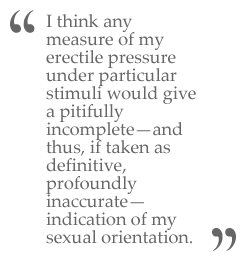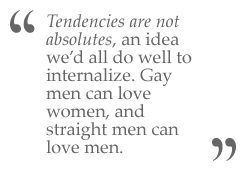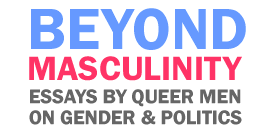|

ver heard of a penile plethysmograph? It’s a medical
testing device, basically a blood-pressure cuff
(sometimes a strip of strain-sensitive metal) that is
wrapped around one’s penis; it measures the volume and
pressure of the erectile tissue of the corpus
cavernosum, and thereby detects erection. It’s meant
to measure physiological arousal, a task at which it is
good but not perfect (most men can suppress our
erections voluntarily, making it appear as if we are not
as aroused as we are; some of us can also do the
opposite); it is often used, however, for the far
grander task of determining sexual orientation and
predicting future sexual behavior.
 I think I would fail a penile plethysmograph. I think
any measure of my erectile pressure under particular
stimuli would give a pitifully incomplete—and thus, if
taken as definitive, profoundly inaccurate—indication of
my sexual orientation. I don’t think I would show up as
the bisexual I know I am, if (as in the typical
experimental profile) you presented me with varying
types of porn and measured the blood pressure in my
penis as I watched it. I already know fairly confidently
that I would respond most to the heterosexual
pornography, including that which displays and glorifies
the female while essentially reducing the male to a
disembodied penis. I would show a weaker response to
lesbian sex and solo females, and a weaker response
still to the vast majority of pornography involving gay
sex and solo males. (Actually if you used furry
pornography, I would probably show a much stronger
response to males and a much more equal response to
males and females—and frankly I have no idea what
accounts for the difference or what it says about my
sexuality.) I would show no response or a negative
response to fetishism such as urolagnia or
sadomasochism, and I would be positively disturbed by
eroticized violence or rape. I think I would fail a penile plethysmograph. I think
any measure of my erectile pressure under particular
stimuli would give a pitifully incomplete—and thus, if
taken as definitive, profoundly inaccurate—indication of
my sexual orientation. I don’t think I would show up as
the bisexual I know I am, if (as in the typical
experimental profile) you presented me with varying
types of porn and measured the blood pressure in my
penis as I watched it. I already know fairly confidently
that I would respond most to the heterosexual
pornography, including that which displays and glorifies
the female while essentially reducing the male to a
disembodied penis. I would show a weaker response to
lesbian sex and solo females, and a weaker response
still to the vast majority of pornography involving gay
sex and solo males. (Actually if you used furry
pornography, I would probably show a much stronger
response to males and a much more equal response to
males and females—and frankly I have no idea what
accounts for the difference or what it says about my
sexuality.) I would show no response or a negative
response to fetishism such as urolagnia or
sadomasochism, and I would be positively disturbed by
eroticized violence or rape.
I know this of course because all of these sorts of
material are readily available on the Internet, I am of
sufficient age to legally view them in my jurisdiction,
and I on occasion avail myself of this opportunity. I
therefore know from my own experience how my own body
responds to these different stimuli. That’s at least
what happens visually; I haven’t systematically analyzed
other sensory modalities—I think my tactile and
olfactory systems are a good bit more egalitarian than
my optical and aural; in embarrassed honesty I must
admit I have a lot more experience with the latter than
the former—but it’s quite possible that even under these
other circumstances I would be on average more
physiologically aroused by specifically heterosexual
stimuli.
Given this, some might wonder why I call myself
“bisexual” at all. If I freely recognize that at least
the majority of my visually-induced physiological
arousal is triggered by females, why not consider myself
straight? There are many reasons—not least that I have
no desire to support, even tacitly, the repression and
patriarchy of institutionalized heterosexuality—but the
most important above all is that arousal is not
orientation. Many people (nearly all of them
straight, but far too many with Ph.D. or M.D. after
their name) have often argued in favor of a theory of
sexual orientation that makes arousal the primary—or
even sole—factor involved in sexual orientation; others
have asserted that arousal is orientation for males, but
not for females, and so on—but the fact of the matter is
that things are much more complicated than that. What I
feel, what I like, what I want, what I need; these
things are related to, but not limited by, the intensity
of physiological response produced by my body.
According to Fritz Klein, sexual orientation is composed
of eight distinct dimensions, which need not be
correlated (but often are). Since two are purely
self-identification, one is behavioral, and two are
social, I would like to focus on the three that I would
truly consider to comprise “orientation,” by which I
mean one’s personal sense of desire or preference for
persons of a particular sex or gender. Though others use
different names, I call these three dimensions the
“erotic,” which relates to the desire for sexual
activity per se; the “romantic,” including
intimate relationships and long-term partnership; and
the “platonic,” which includes friendship and general
social association. Of course, these three spheres are
not wholly distinct, and we can imagine that there may
be some grey areas, but I think they provide a useful
tool for understanding.
The problem with science trying to measure the
culmination of these three things—my “aggregate
sexuality,” as it were—is that most measures available
focus almost exclusively on one dimension or another.
For instance, a plethysmograph (that penis-measuring
device I mentioned earlier) can at best only
describe my erotic orientation; even at this it isn’t
perfect, since I might still be most erotically drawn to
something other than what produces the strongest
physical response. Still, it’s not a bad measure: Given
that I respond most strongly to heterosexual porn, it
might be reasonable on this basis to say that I am
probably to some degree heteroerotic. But this is only
of incidental relevance to my romantic
orientation, which describes the sort of persons that I
would most prefer to enter a relationship with and
maintain consistently as a life partner. As it turns
out, I must consider myself homoromantic to some
degree, because I would rather that my life partner be
physically male and psychologically somewhat masculine.
(Platonic orientation usually doesn’t bother people as
much; as it turns out I happen to be fairly biplatonic,
with relatively equal distribution between male and
female friendship.)
 But wait—how can I be heteroerotic, on the one hand, and
homoromantic, on the other? Does it mean that I couldn’t
possibly have a relationship with a woman, or that in a
relationship with a man I couldn’t possibly enjoy sex?
No, it doesn’t. Tendencies are not absolutes, an
idea we’d all do well to internalize. Gay men can
love women, and straight men can love men. It’s
unfortunate that most people don’t understand this, and
indeed may well be shocked by the idea; but that doesn’t
change the truth. The fact that I would “prefer” in some
abstract sense to be partnered with a man for the rest
of my life does not render it completely impossible that
I should end up with a woman, though it may indeed be
less likely. And what about the converse; might my
physiological inclination towards women make it more
difficult to settle down with a man? I don’t know; maybe
it already has. That might be a reason to change it
(which way?), were there any evidence that such a
voluntary change is possible; I have studied the
relevant psychology enough to say that no such evidence
exists. I think on some level my erotic response is more
based on sex (anatomy, biology, that sort of thing), and
my romantic response is more based on gender (identity,
social identity, personality)—so perhaps a transman
would be a good fit for me? If so, why does that not
seem especially appealing right now? But wait—how can I be heteroerotic, on the one hand, and
homoromantic, on the other? Does it mean that I couldn’t
possibly have a relationship with a woman, or that in a
relationship with a man I couldn’t possibly enjoy sex?
No, it doesn’t. Tendencies are not absolutes, an
idea we’d all do well to internalize. Gay men can
love women, and straight men can love men. It’s
unfortunate that most people don’t understand this, and
indeed may well be shocked by the idea; but that doesn’t
change the truth. The fact that I would “prefer” in some
abstract sense to be partnered with a man for the rest
of my life does not render it completely impossible that
I should end up with a woman, though it may indeed be
less likely. And what about the converse; might my
physiological inclination towards women make it more
difficult to settle down with a man? I don’t know; maybe
it already has. That might be a reason to change it
(which way?), were there any evidence that such a
voluntary change is possible; I have studied the
relevant psychology enough to say that no such evidence
exists. I think on some level my erotic response is more
based on sex (anatomy, biology, that sort of thing), and
my romantic response is more based on gender (identity,
social identity, personality)—so perhaps a transman
would be a good fit for me? If so, why does that not
seem especially appealing right now?
|




6 COMMENTS ON THIS ESSAY:
It bothers me that Patrick takes on the title of "bisexual", particularly because of my own struggles with these same experiences.
I am an 18-year-old male, that for 7 years has been predominantly sexually attracted to males, while still having a powerful sexual attraction to the single woman I have identified to be as the love of my life.
My experience has been that while thinking of myself as "gay" was the title that made the most sense (to me) it was still partly inaccurate. For society, which observed my growing 3 and a half year relationship with my girlfriend, and my physical dynamics with her, it was assumed that I "must be BI". This category bothered me even more, because I have never, aside from my girlfriend, been able to identify a woman who could consistently give me an erection.
Furthermore, there are even some (specifically my family) who continue to categorize me as "straight", and discard any displays of affection I may have towards men as "temporary confusion".
The bottom line is that I do not feel ANYONE has the right to force me under the umbrella of any of these three categories. I am NOT gay, NOT straight, and NOT bisexual... and though at times it may be simpler to tell people I'm gay to justify my behaviors and to offset the courting from other women, to say I am "GAY" is to lie about who I really am.
I see myself as QUEER (i.e. UNCONVENTIONAL)
I am a straight woman who finds the idea of bisexuality or ambiguous sexuality in men, frankly, horrifying and threatening on a very visceral level. Articles like this have been crucially important to challenging that reaction, by helping me understand the extent to which forced binary sexuality limits the possibilities in all relationships, and I really appreciate Patrick's honesty and candor.
I also think its important to discuss the degree to which life experience would also seemingly dictate the descriptors one would use to define their own sexuality, i.e. whether or not you happen to meet the one woman or man (or 2 or 10) who can give you an erection/whom you fall in love with (I realize the terms man and woman are also generalizing, but since thats sort of the premise of the essay, bare with me). I think there should be more discussion regarding the fact that often times in life "orientation" depends a lot on the specific person/s (rather than necessarily pornography) that we find ourselves attracted to, a concept which I think of as even more disturbing and beautiful.
I really enjoyed this essay and Patrick's honesty. It was very helpful in my understanding complexities that exist within sexualities. I have always easily and comfortably fit into the identities of homoerotic attraction, but bringing in the other realms of romance and platonic orientations has really got my mind turning. Thanks for the insightful and provocative analysis!!
"is currently working on an invention that provides cardiovascular exercise and reduces carbon dioxide emissions at the same time."
sorry man, someone already invented that. it's called the bicycle.
This is a really great essay. It is really close to my own experiences. Thanks for letting the B's of LGBT know that we are not the only ones who are a bit 'queer'
This is the sort of stuff that should be taught in sex-ed classes! I wish more people understood the world this way - it always seemed like such an obvious truth to me, and yet most people I know are so stuck in the "gay / straight" world (often even denying the existence of bisexuality or anything like it). This writer's character is so ridiculously me, I'm wondering if I have a long-lost twin I was never told about! :P